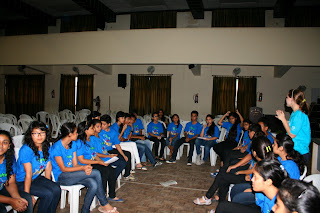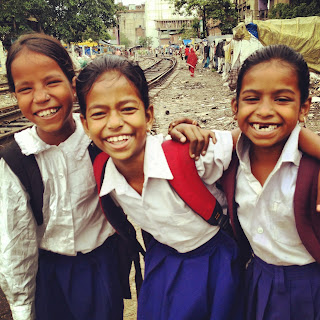My last week in Guwahati was an incredible whirlwind. I was very busy finishing up projects at the centre and enjoying taking the girls to school the last few days. I continued stressing to them, "I am going home but you are going to school." Lots of last lunches and last dinners at friend’s houses. Lots of tears, hugs, goodbyes, and wondering when I will be back. Because we all know, I will be back. I have never eaten so much (rice) in my whole entire life. For every meal, I was at a friend’s house, saying my goodbyes and learning more and more about generosity. And in India, guests are Gods so they pile on the hospitality and food. I am so thankful for everyone who welcomed me into their homes and into their lives throughout my time in India. They gave me such a sense of community. Without that, it wouldn't have been the same.
The centre gave me a very nice send off. It was so special to make lifelong friends in a place filled with people who simply care to improve children’s lives. Then, on my very last day, I went to feed the children in Lakhtokia. Those goodbyes and riding away from those children as they chased after me was almost more than I could bear. Rosie, my flat mate, then whisked me away and took me to a dance center that just opened for a Bollywood dance class. For an hour and a half, we danced the departure blues away. It was a hoot and if I still lived in Guwahati I would be dancing Bollywood everyday.
And now, I find myself back in America. In just one plane ride, I land in a culture that used to feel so normal, so right. And now, I am shocked at excess. I am shocked at how my heart legitimately hurts as I think about what Khausitan and Komala are doing at this very moment. Did Kristin have an easy time getting the girls to school today? Is Puja staying out of trouble? Is Abita staying safe from the monsoon? Is Pinky enjoying her new job? Is the centre staying busy with the upcoming mission? Is the “egg guy” selling all of his eggs? Is Rosie enjoying her new Bollywood dance class? Did Mashu have a good day at school? Did Omit make it through another grueling day? Did Hina get past her attitude and walk to school this morning?
If I listed what goes through my mind before I go to sleep, when I wake up, when I am making lunch, then this post would be the longest post ever. I am so thankful for this experience and so thankful for what I have learned. But I am not going to sugar coat everything and say I am having an easy transition. This is hard. For what it"s worth, I have learned that I love the kids in the slum. I love Renuka, the cleft lip patient. I love Khausitan and Komala; they were a pain every now and then, but their determination despite their surroundings, inspire me everyday. I am filled with love and it is up to me to be able to bring that love and compassion here. I think after a couple of weeks the adjustment will be better. Now, I am grieving. But, I will get back in the groove of things. Even so, I know I will continue thinking about Guwahati forever. Remembering the sensory overload and all of my friends. Lakhtokia and all of my friends there will never leave my mind. I think about them every second of the day.
“Always leave a place better than you found it.” I hope I gave Guwahati what Guwahati gave me. I hope I gave GC4 what GC4 gave me. I hope I gave Lakhtokia what Lakhtokia gave me. I learned something from every person I met, from every experience I had, and from every walk I took.
As my flat mate Rosie said, “India will always be here.” And it better be, because I am coming back for it: I am coming back for Lakhtokia and Pratyasha, I am coming back for Operation Smile, and I am coming back for Guwahati.
Always sending smiles from wherever I am,
Hannah
Photos of my last few days in no particular order:


























































